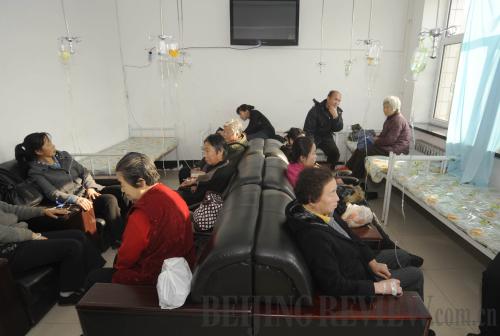|
 |
|
BETTER MEDICAL ATTENTION: Patients receive treatment at a local community health center in Qitaihe in northeast China's Heilongjiang Province. The city has strengthened its local community health centers, giving residents easy access to medical services (QIN CUNGUANG) |
The State Council on December 3 announced new policies to encourage private and foreign capital in China's medical sector to meet the country's diversifying demands on health care. The new policies, dubbed the "guideline to encourage and lead social capital to sponsor health-care institutes," stipulated that social capital should enjoy preferential treatment as China adjusts its medical resources, and social capital will be encouraged to participate in restructuring the hospital system. As an added bonus, overseas investments are being welcomed to sponsor hospitals and the process of involving more foreign investors will be further simplified in the coming years.
Non-state medical institutes vigorously developed and expanded following China's reform and opening up in 1978. According to the Ministry of Health's China Health Statistical Yearbook 2010, out of 907,249 medical institutes in China in 2009 only 113,624 were backed by the government.
Although non-state hospitals far outnumbered state-run ones, their capacity to treat patients is limited. Most non-state medical institutes are small and specialize in specific medical disciplines, such as ophthalmology, gynecology, andriatrics, dentistry and cosmetology, rather than comprehensive medical treatment.
The guideline also said that non-state hospitals should improve their service efficiency and quality so that state-run and non-state medical institutions could help each other to improve.
The government will also provide more preferential policies for non-state hospitals. Social funded non-profit medical institutes will be able to enjoy the same taxation and pricing policies as government funded ones. For-profit medical facilities will pay corporate income taxes and be exempt from business taxes. As it stands, only state-run hospitals can contract medical insurance, but the guideline will change that—patients can get their expenditures reimbursed for services at non-state hospitals.
China's medical resources accounted for only 5 percent of its GDP, much lower than the global average level of 9 percent, said Liu Guo'en, a professor with the Guanghua School of Management at Peking University. This explains why China's medical service capacity lagged far behind people's demand.
The policies are part of China's new round of medical reforms launched last year and are expected to raise efficiency for investors in medical institutes and facilities, said Liu.
"In five to 10 years, China can settle its health care burdens and provide sufficient health care services to everyone," Liu said.
Equal opportunities
According to OCN, a Shenzhen-based consulting company, the guideline will present an excellent opportunity for private capital to enter the medical sector.
| 